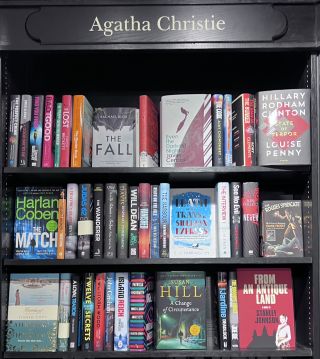Cognition
Can Agatha Christie Help Us Solve the Mystery of Longer Life?
Research about how reading can boost our brain and health.
Posted August 17, 2023 Reviewed by Michelle Quirk
Key points
- Reading for pleasure can help lower risk of Alzheimer's disease.
- Three hours of reading a week may contribute to a longer life.
- A sobering finding: The more television watched, the greater risk of death from all causes.

Groucho Marx once quipped, "I find television very educating. Every time somebody turns on the set, I go into the other room and read a book."
Bookworms form a community of like-minded individuals who celebrate the interplay of words and the artistry of weaving them into books. Yet there also exists a parallel universe populated by those fluent in the alternative realm of streaming services. They celebrate reality shows, the latest limited series, documentaries, and comedy specials.
This tension between the written word and the pixelated screen has intensified during past years, particularly during the pandemic. Gallup reports Americans report reading an average of 12.6 books a year, far fewer books than any time since 1990. Pew Research seconds this noting a quarter of American adults have not read a single book, in part or whole, for the past year in any format.
Is it a coincidence that this dip in reading coincides with a meteoric rise in streaming services such as Netflix, AppleTV, Max, and Hulu? The surge in streaming services burgeoned, with a 200-percent jump in subscription video services over the past four years, with 89 percent of households subscribing to an average of 5.4 services. Further, Nielsen reports the average American watches more than four hours of television each day—that’s two months of nonstop TV-watching per year.
As an author, voracious reader, and someone whose childhood superpower was circumventing bedtime curfew by reading with a flashlight deep into the night, I found this news disheartening. It made me wonder about the ramifications of choosing screen-based entertainment over books.
The benefits of reading have long been clear. Reading stimulates the mind and sparks intellectual curiosity. Reading prods our imagination as we consider the context and association of words, and it sharpens our critical thinking skills. Reading also whisks us away from reality into a galaxy of alternative worlds.
And there’s more….
Reading nurtures our brain. Readers have a reduced risk of Alzheimer’s disease. The practice of reading exercises the brain and may prevent the build-up of amyloid plaques and tau tangles. In one of the largest studies ever conducted, 2,800 adults were followed for 12 years to understand reading habits and brain health. The results were stunning: Those who read at least three hours a week were 20 percent less likely to develop Alzheimer's disease than those who did not read. Reading pays off by requiring us to pay attention rather than multitask. And for those seeking to amplify this benefit, read fiction! Fiction readers had a 32-percent-lower risk of developing Alzheimer’s as compared to those who do not read.
Readers live longer. Reading can contribute to a longer lifespan. An international study of 3,600 people tracked mortality and reading habits over a 12-year period and found that those who read at least three hours a week were 20 percent less likely to die during the study period than those who did not. Again, the risk reduction was even greater for those who read fiction with a 32-percent-lower risk of death.
Reading offers a cornucopia of resilience skills. Reading fiction in particular boosts empathy, regulates emotions, and reduces stress, all key factors when managing adversity. Reading fiction allows us to engage in what is called “mentalizing,” the ability to step into another’s shoes by inferring the thoughts and feelings of others. At a time in our society when polarization is on the rise, perhaps the path toward reconciliation begins with a good novel.
Reading is a mini-break. Reading also is a pathway to escape day-to-day problems. It has been shown that reading for just six minutes can improve mood and reduce stress levels by up to 68 percent. This is because reading, just like a vacation, can make us feel happier, more tranquil, and entertained.
Conversely, should you need further motivation, consider this: A study in the Annals of Internal Medicine explored the relationship between television and mortality. The conclusion is sobering: The more television watched, the greater the risk of death from all causes, including cardiovascular disease and cancer with those who viewed more than four hours of television a day at the greatest risk.
The television Writers Guild strike interjects an interesting wildcard. The labor disruption is threatening to cut off our access to new streaming programs in the fall. Might there be a silver lining? Will the dearth of new programming prompt us to set down the remote and turn our attention to our bookshelf where novels, memoirs, and nonfiction books are quietly waiting, gathering dust?
Here’s the crux of it all: Television is passive, a spectator sport. In comparison, the sheer act of turning the pages of a book actively takes us through a portal where we can travel around the globe, back or forward in time, deep within ourselves, and into the hearts and minds of others.
Or, as Dr. Suess so well said, "The more that you read, the more things you will know. The more that you learn, the more places you'll go."
References
Wilson, R. S., et al. (2017). Reading and risk of Alzheimer's disease. Neurology, 89(1), 31–37.
Smith, G. D., & Pell, J. P. (2012). Association of book reading with slower cognitive decline in older adults. British Medical Journal, 345, e4569.
Levy, B. R., Ailshire, J. A., & Kivimaki, M. (2016). A chapter a day: Association of book reading with longevity. Social Science & Medicine, 165, 195–201.
University of Warwick: McKeown, M. G., & Silvia, P. J. (2011). Effects of reading fiction on empathy and prosocial behavior. Scientific Study of Literature, 1(1), 75–91.




